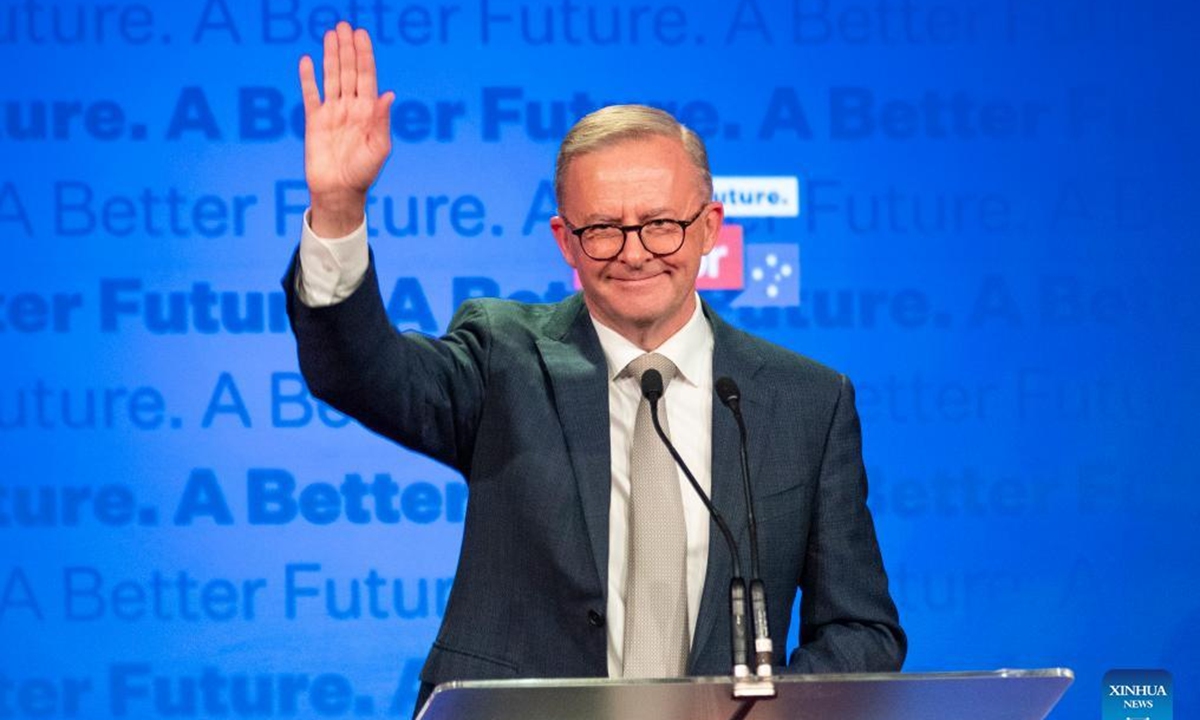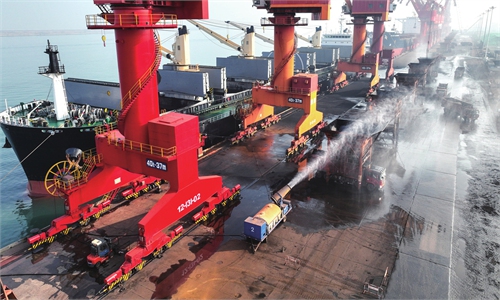Albanese to visit China during CIIE, expected to boost trade exchanges and start new chapter of bilateral ties

Anthony Albanese gestures as addressing supporters in Sydney, Australia, May 21, 2022. Photo: Xinhua
The visit of Australian Prime Minister Anthony Albanese will not only be about warming up China-Australia relations, but also open a new chapter and set the tone for future bilateral ties, Chinese analysts said, as Albanese said he will visit China in early November and meet with the country's top leader, announcing the trip hours before he departed for the US to meet with President Joe Biden.
The Chinese visit dates were confirmed the same day as the Chinese Ministry of Commerce confirmed that Beijing had reached an agreement with Canberra on a "proper resolution" of trade disputes over wine and wind towers after similar announcements were made by Australia.
"China and Australia are important trading partners to each other, and China is willing to continue through dialogue and negotiation, working together to advance the stable and healthy development of our bilateral economic and trade relationship," the ministry said in a statement.
According to Australian media outlet ABC News, Albanese will become the first Australian prime minister to visit China in seven years when he travels to Beijing and Shanghai on November 4-7.
The Chinese side has not yet confirmed Albanese's visit.
"It's in Australia's interest to have good relations with China," Albanese told reporters at Australian Parliament House in Canberra on Sunday.
Albanese's visit to China has both political and economic motivations, Chen Hong, president of the Chinese Association of Australian Studies and director of the Australian Studies Center at East China Normal University, told the Global Times on Sunday.
Former Australian Labor Prime Minister Gough Whitlam made a historic visit to China on October 31, 1973 following the establishment of diplomatic relations with China in 1972. Fifty years later, Albanese clearly wants to pay tribute to his predecessor's contribution to the China-Australia relationship and follow in his footsteps, Chen believes.
In terms of economic motivation, Albanese decided to visit China during the sixth China International Import Expo (CIIE) in Shanghai as the cornerstone of China-Australia relations is economic and trade ties, Chen noted.
"Both politically and economically, this visit holds significant importance," the expert said. It is expected that both sides will strategically plan and set the tone for the future of bilateral relations in the next 50 years, he predicted.
The most important significance of Albanese's visit is not just about warming up bilateral ties, but it marks a new chapter, Chen said.
Some analysts believe that Albanese's potential China visit to China can be seen as withstanding pressure from both domestic and foreign sources, such as opposition from the US and anti-China forces within Australia.
Chen said the Albanese administration has demonstrated more political wisdom and strategic vision compared with the previous administration. By announcing the visit to China before his visit to the US, it shows that Albanese does not want the influence of the US to disrupt his schedule to visit China, Chen added.
He continued that Australia has always lacked an independent foreign policy, and the US-Australia alliance is undoubtedly the cornerstone of its foreign policy. However, in the process, Albanese seeks to carve out more independent space for Australia.
Albanese will travel to the US from October 23 to 26 for an official visit hosted by Biden in Washington, DC. They will discuss regional stability and security, AUKUS, strengthening cooperation in science and technology and the importance of together shaping an open, stable and prosperous the so-called Indo-Pacific, according to the official website of the Australian prime minster.
When Albanese visits the US next week, the main topic of discussion is likely to be AUKUS, as since its announcement in 2021, AUKUS has failed to deliver almost anything, making it still an "empty promise," Chen said.
Australia hopes to materialize and crystallize AUKUS, turning it into something substantial. However, considering the significant amount of effort and attention especially on military and defense the US has put into the Ukraine crisis and the Palestine-Israel conflict, it raises doubts about whether Australia's needs can still be taken into account in time, according to the analyst.



